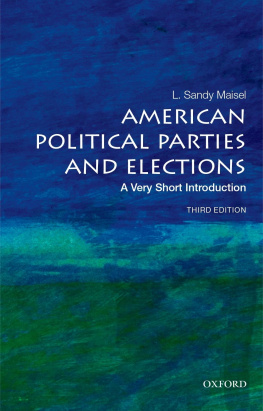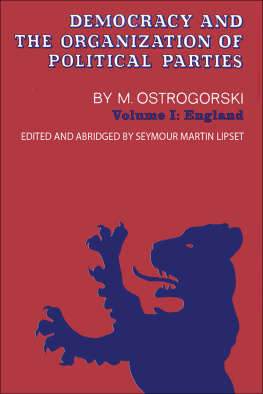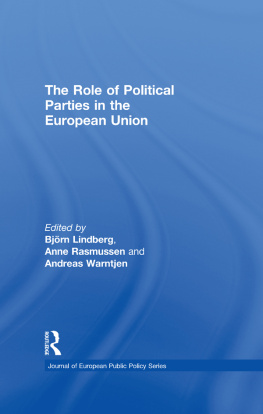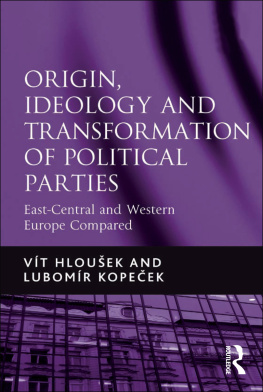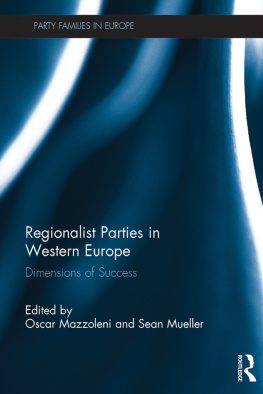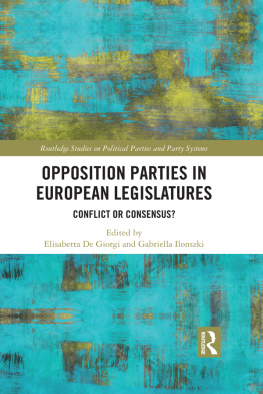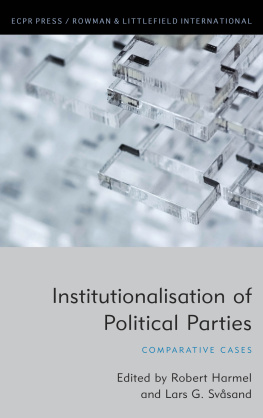Political Parties in Western Democracies


Preface To Transaction Edition
Apart from this preface and a lengthy postscript, the present edition consists of a book published over a decade ago and largely conceived in the early 1960's. I have let the work stand despite the importance of later developments and of recent democratic self-doubts. I like to think that the earlier perspective remains useful, and that my own limitations have not been the sole deterrent to producing a completely new edition. Revising and updating, however, would have been a prodigious task. Confronting the last decade's vast scholarly literature on parties, I would have been even less able than earlier to write a comprehensive account of political parties in Wester democracies. For reasons noted in the first chapter, I rely most heavily on experience in English-speaking nations, and really on aspects of that experience which relate to certain major themes. The book's main purpose has always been to present these themes rather than to provide a full coverage of standard material, updated or not.
Verbatim reprinting should not suggest self-satisfaction. Although my basic approach remains largely unchanged, I would not now write the same book. Certainly the book's themes have to be reconsidered in light of knowledge available by the late 1970's. I undertake such reconsideration, selectively to be sure, in the postscript chapter. It is my most explicit but not my first reexamination of party developments since the 1960's. I shall refer to other published efforts in the postscript. Like the reconsideration here, those publications owe a good deal to discussions in my courses and seminars, and also to specific research opportunities in Finland, Great Britain, Australia, and the United States. For these opportunities, over the last eight years, I am grateful to the Graduate Research Committee of the University of Wisconsin-Madison, the University of Helsinki, the Australian National University, the Australian-American Educational Foundation, and the Center for Advanced Study in the Behavioral Sciences. Learning more about Finnish and Australian parties had particular relevance for my concerns. I want also to thank the National Endowment for the Humanities for its support of a seminar on political parties that I conducted for college teachers in 1976-77; the post-doctoral members of that seminar were most helpful and stimulating.
One other prefatory comment is in order. The difficulty of generalizing cross-nationally about political parties or about related political phenomema has not kept others from impressively completing larger scholarly works than mine. Focusing on the nature of party competition, Giovanni Sartori has now published Volume I of his Parties and Party Systems (New York: Cambridge University Press, 1976); its range of learning, well beyond the universe of Western nations, is enormous. So, within its sphere, is a collaborative study like Electoral Behavior: A Comparative Handbook, edited by Richard Rose (New York: Free Press, 1974). Marked as they are by quantitative methods rigorously applied to quantitatively tractable problems, such works lead me to think of my more subjective study as a different and more modest endeavor. It is not scientific in the usual sense of the term. My empiricism, while it occasionally involves quantitative information, is of a rough-and-ready kind. I speculate about matters for which I have no more than illustrative material, and advance arguments that may not lend themselves to definitive confirmation or refutation. I admit to these nonscientific concerns without apologizing for them. They seem important enough for scholarly inquiry. I hope, however, that I have been careful in the original text to distinguish speculation from scientific findings; I am certainly conscious of the need to do so in my postscript. Indeed, if I were writing the book afresh, I would studiously avoid even the relatively limited social science language that I employ from time to time. It may convey an exactness or conclusiveness that I cannot claim. More than ever, I am impressed with the degree to which many significant political phenomena are linked to circumstances of time and place, and how cautious we should be in generalizing about what is happening generally, in contrast to what has happened in particular nations.
Leon D. Epstein
Madison, Wis.
March 1978
Preface
My work falls short of an attempt, originally considered, to assemble a great deal of information about political parties in all Western democratic nations. I have often relied very heavily on American and British material. In the introductory chapter, I describe the difficulties of the broader task for any author and notably for me. To these difficulties I should add that I took so long to write and revise the material, which I had collected mainly in 1963 and 1964, that there is by this time new information that would have been useful for my purposes. I have tried, while writing and revising, to note events and research of the last few years, but there are certain recent works that I have not been able to use. One example is Giovanni Sartori's insightful conceptual treatise on political parties. Thanks to his generosity, I had the opportunity to read his work in a mimeographed version, but only after I had completed my manuscript.
Material that I had previously included in articles written for various academic journals is indicated in footnote references. In one instance, "British Class Consciousness and the Labour Party," published in the Journal of British Studies, I have used here substantial portions of my original article, and for permission to reproduce them I am grateful to the Journal editor, Professor Willson H. Coates. I should also note that a preliminary sketch of the ideas for this book was given in a paper presented in the fall of 1964 at Indiana University, later published in a shortened version in Essays in Political Science, edited by Edward H. Buehrig (Bloomington: Indiana University Press, 1966), and then republished in its original length in Political Parties: Contemporary Trends and Ideas, edited by Roy Macridis (New York: Harper & Row, 1967). The ideas discussed in that paper were modified considerably in the process of writing the present book, and what appears here represents a more recent and revised judgment than does the paper in either of its published versions. The later judgment owes a good deal to critical suggestions of colleagues who read the original paper.
I am indebted to many helpers during the long period that I spent preparing this work. Financially I am glad to acknowledge the sup port of the Rockefeller Foundation and the Social Science Research Council, which together made it possible for me to devote the entire academic year of 1963-64 to research and writing, and the support of the Graduate Research Committee of the University of Wisconsin, which provided summer salary and also funds for research assistants. These assistants, serving in turn while graduate students, were William Simpson, John Kingdon, Judith Langenfeld, and David Griffiths. I am grateful to each chiefly for bibliographical work but occasionally for tabulating data. Similarly I am grateful to Joyce Pajala, an undergraduate student who typed the first draft and checked bibliographical references, and to Geraldine Hinkel, who managed to type most of the final draft while still performing her principal task of administrative service for the College of Letters and Science at the University of Wisconsin. I have been fortunate to have such help.
Next page


